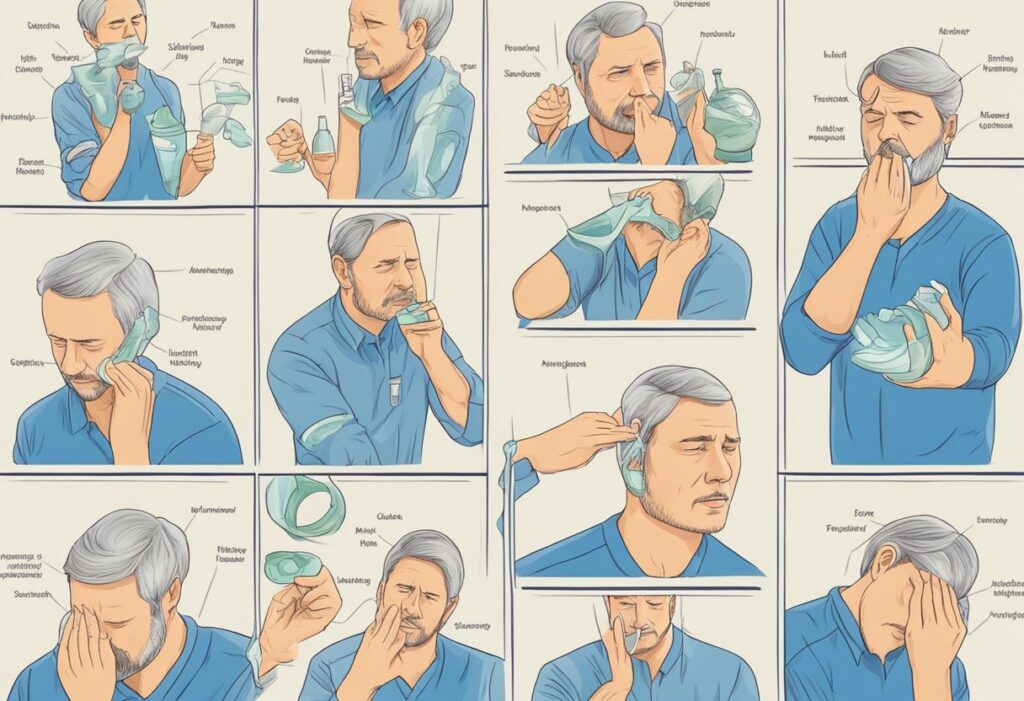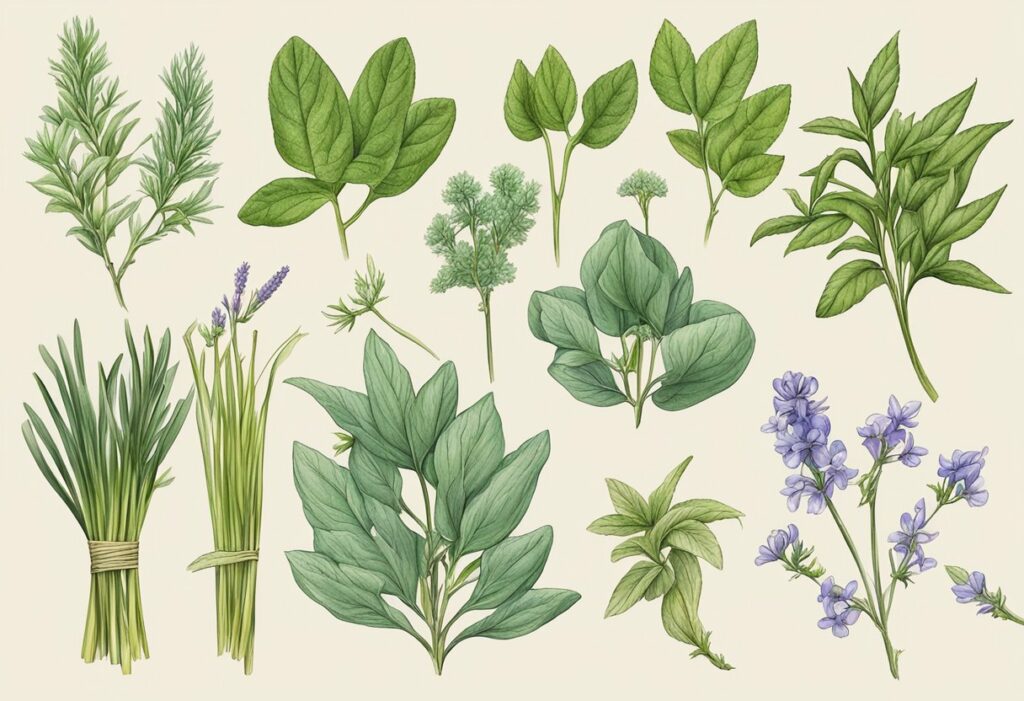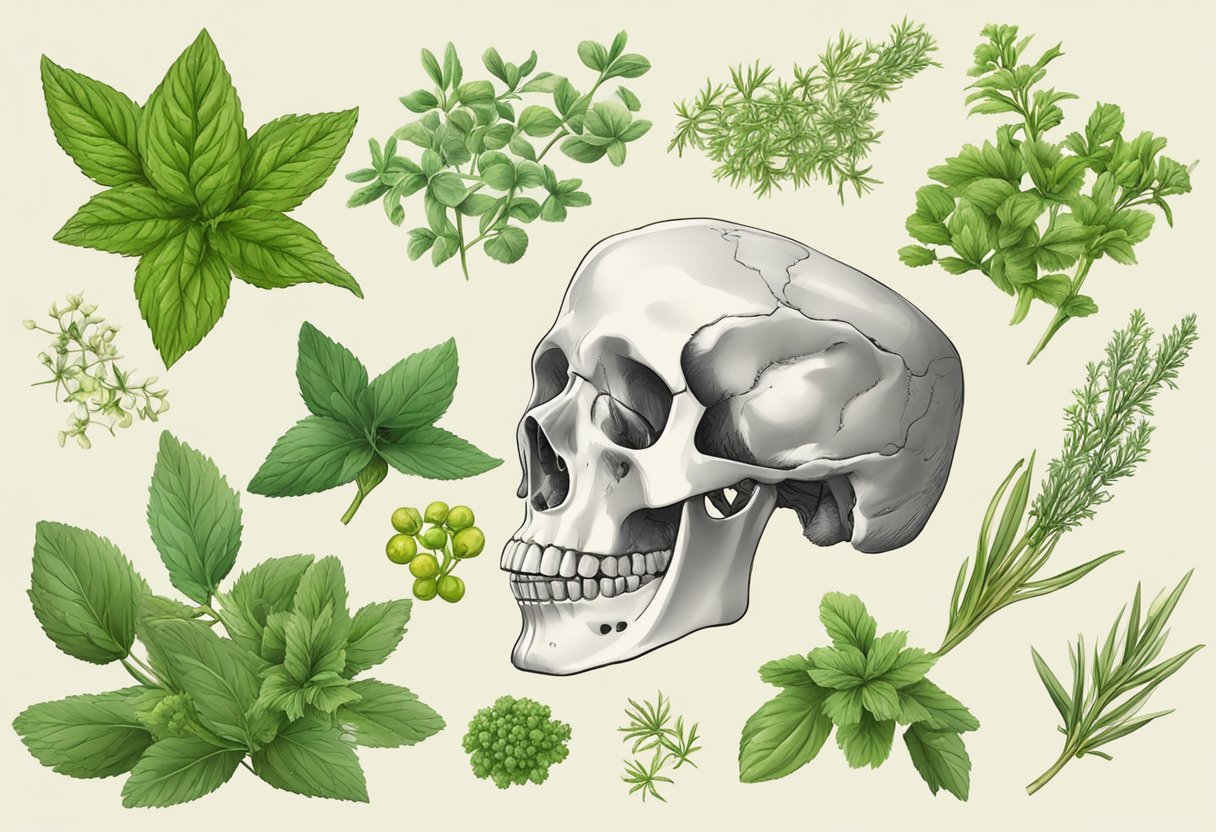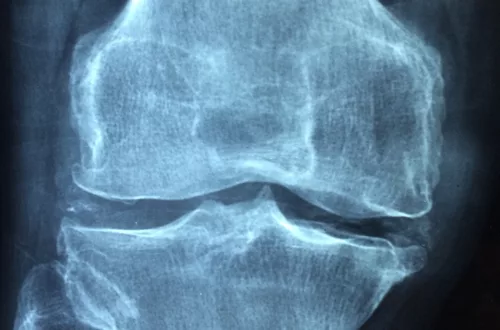Herbs have been used for medicinal purposes for centuries, and they continue to be a popular alternative treatment for various health conditions. Temporomandibular joint disorder (TMJ) is a condition that affects the jaw joint and can cause pain and discomfort. While there are conventional treatments available for TMJ, some people prefer to use natural remedies, such as herbs, to manage their symptoms.
Disclaimer: This article is provided for informational purposes only and should not replace professional medical advice. Please consult with a qualified healthcare practitioner or herbalist before using any herbal remedies.
Several herbs have been studied for their potential benefits in managing TMJ symptoms. For example, turmeric is a spice that has anti-inflammatory properties and may help reduce pain and swelling associated with TMJ. Another herb, chamomile, has been traditionally used for its calming properties and may help alleviate stress and anxiety, which can contribute to TMJ symptoms. In this article, we will explore some of the herbs that may be beneficial for people with TMJ and their potential benefits.
Understanding TMJ Disorders
Temporomandibular joint (TMJ) disorders refer to a group of conditions that affect the jaw joint and the muscles that control its movement. TMJ disorders can cause pain and difficulty in jaw movement, making it difficult to eat, speak, or even yawn.
The temporomandibular joint connects the jawbone to the skull and is responsible for the movement of the jaw. TMJ disorders can be caused by a variety of factors, including injury to the jaw, grinding or clenching of teeth, arthritis, stress, and poor posture.

Symptoms of TMJ disorders can vary from person to person, but commonly include pain or tenderness in the jaw joint, clicking or popping sounds when opening or closing the mouth, difficulty in opening the mouth wide, and a locking of the jaw joint.
Temporomandibular disorder (TMD) is a term used to describe a range of conditions that affect the TMJ. TMD symptoms can be acute or chronic and can affect one or both sides of the jaw.
Common inducers of TMJ disorders include stress, anxiety, and tension, which can cause a person to clench or grind their teeth unconsciously. This can lead to pain and discomfort in the jaw joint and surrounding muscles.
Temporomandibular joint pain affects a significant portion of the population, with some studies suggesting that up to 30% of adults may experience TMJ pain at some point in their lives. Understanding the causes and symptoms of TMJ disorders is essential in managing this condition effectively.
Symptoms of TMJ
Temporomandibular joint disorder (TMJ) is a common condition that affects the jaw joint and the muscles that control jaw movement. The symptoms of TMJ can vary from person to person, but some of the most common symptoms include:
- Jaw pain: TMJ can cause pain in the jaw joint that may be felt on one or both sides of the face. The pain may be dull or sharp and may worsen when chewing or talking.
- Muscle spasms: TMJ can cause muscle spasms in the jaw, neck, and shoulders. These spasms can be painful and may limit range of motion in the jaw.
- Range of motion: TMJ can cause limitations in the range of motion of the jaw. This can make it difficult to open the mouth wide or move the jaw from side to side.
- Jaw muscle stiffness: TMJ can cause stiffness in the muscles of the jaw, making it difficult to move the jaw freely.
- Difficulty chewing: TMJ can make it difficult to chew food, especially hard or chewy foods.
- Lock jaw: In some cases, TMJ can cause the jaw to lock in an open or closed position. This can be painful and may require medical intervention to correct.
- Facial pain: TMJ can cause pain in the face, including the cheeks, temples, and ears. This pain may be dull or sharp and may worsen with certain movements of the jaw.
It is important to note that not all people with TMJ will experience all of these symptoms. Some people may only experience a few of these symptoms, while others may experience all of them. If you are experiencing any of these symptoms, it is important to speak with a healthcare provider for an accurate diagnosis and appropriate treatment.

Natural Remedies for TMJ
Temporomandibular joint (TMJ) disorder can cause pain and discomfort in the jaw, face, and neck. While there are medical treatments available, some people prefer to use natural remedies to manage their symptoms. Here are some natural remedies that may be helpful for TMJ:
Dietary Changes
Eating a soft diet can help alleviate TMJ pain. Soft foods like mashed potatoes, scrambled eggs, and smoothies are easier to chew and put less stress on the jaw joint. Avoiding hard, crunchy, or chewy foods can also help prevent further damage to the joint.
Warm Compresses
Applying a warm compress to the affected area can help reduce pain and inflammation. A warm towel, heating pad, or hot water bottle can be used to apply heat to the jaw joint. Be sure to use a comfortable temperature and avoid burning the skin.
Essential Oils
Some essential oils may have pain-relieving and anti-inflammatory properties that can help alleviate TMJ symptoms. Lavender oil, in particular, has been shown to reduce pain and anxiety in people with TMJ. Other oils that may be helpful include peppermint, eucalyptus, and frankincense.
Herbal Remedies
Certain herbs may have anti-inflammatory properties that can help reduce TMJ pain and inflammation. Turmeric, ginger, and devil’s claw are all herbs that have been used for their anti-inflammatory effects. However, it’s important to talk to a healthcare professional before using any herbal remedies, as they may interact with other medications or have side effects.
Vitamin C
Vitamin C is an antioxidant that may help reduce inflammation in the body. Eating foods high in vitamin C, such as citrus fruits, strawberries, and broccoli, may help reduce TMJ pain and inflammation.
Natural Way
In addition to the above remedies, making lifestyle changes can also help manage TMJ symptoms. Stress can exacerbate TMJ pain, so finding ways to manage stress, such as through meditation or yoga, may be helpful. Improving posture and avoiding clenching the jaw can also help prevent further damage to the joint.
Home Remedies
There are several home remedies that may help alleviate TMJ symptoms. Massaging the jaw muscles, practicing relaxation techniques, and avoiding gum chewing can all help reduce pain and inflammation.
Overall, while natural remedies may be helpful for managing TMJ symptoms, it’s important to talk to a healthcare professional before trying any new treatments. They can help determine the best course of action based on individual needs and medical history.

Role of Physical Therapy
Physical therapy is a non-invasive treatment option that can help to alleviate TMJ pain and dysfunction. A physical therapist can work with a patient to develop a personalized treatment plan that may include a combination of exercises, manual therapy, and relaxation techniques.
One of the main goals of physical therapy for TMJ is to improve the range of motion in the jaw joint. This can be achieved through exercises that focus on strengthening the muscles that control jaw movement. A physical therapist may also use manual therapy techniques, such as massage or mobilization, to help improve joint mobility and reduce pain.
Relaxation techniques, such as deep breathing, can also be incorporated into a physical therapy treatment plan. These techniques can help to reduce muscle tension and promote relaxation, which can in turn help to alleviate TMJ symptoms.
In addition to providing hands-on treatment, a physical therapist can also provide education and guidance on how to manage TMJ symptoms at home. This may include advice on posture, stress management, and self-massage techniques.
Overall, physical therapy can be an effective treatment option for TMJ pain and dysfunction. By working with a physical therapist, patients can develop a personalized treatment plan that addresses their specific needs and goals.
Medical Treatments for
There are several medical treatments available for TMJ, including pain relievers, muscle relaxants, and new treatments that have been developed through clinical studies.
One of the most common medical treatments for TMJ is pain relievers. These can include over-the-counter medications such as ibuprofen or acetaminophen, or prescription medications such as tramadol or codeine. Pain relievers can help to reduce the discomfort associated with TMJ, but they do not address the underlying causes of the condition.
Another option for medical treatment of TMJ is muscle relaxants. These medications are designed to relieve muscle spasms and tension, which can contribute to TMJ pain and discomfort. Muscle relaxants such as cyclobenzaprine or diazepam can be prescribed by a doctor to help manage TMJ symptoms.
Dental x-rays may also be used as a medical treatment for TMJ. These images can help to identify any underlying dental conditions that may be contributing to TMJ symptoms, such as tooth decay or gum disease. Treatment of these conditions can help to alleviate TMJ symptoms.
In recent years, new treatments for TMJ have been developed through clinical studies. These treatments may include the use of acupuncture, herbal remedies, or other alternative therapies. While the effectiveness of these treatments is still being studied, some patients have reported relief from TMJ symptoms after undergoing these treatments.
It is important to note that medical treatments for TMJ should always be administered under the guidance of a qualified healthcare professional. Patients should also be aware that while these treatments can help to manage TMJ symptoms, they do not cure the condition. Patients may need to continue with ongoing treatment to manage their TMJ symptoms over time.

Self-Care Techniques
Self-care techniques are an essential aspect of managing TMJ pain and improving the overall quality of life for individuals with TMJ disorder. Here are some self-care techniques that can help alleviate TMJ pain:
Ice Pack
Applying an ice pack to the affected area is a great way to reduce inflammation and pain caused by TMJ disorder. Wrap an ice pack in a towel and apply it to the affected area for 10-15 minutes at a time, several times a day.
Cold Therapy
Cold therapy, also known as cryotherapy, can help reduce TMJ pain and swelling. It involves the use of a cold compress or ice pack to numb the affected area, which can reduce pain and inflammation.
Stress Levels
Stress can cause tension in the jaw muscles, exacerbating TMJ disorder symptoms. To reduce stress levels, individuals can try relaxation techniques such as deep breathing, meditation, or yoga.
Quality of Life
TMJ disorder can negatively impact an individual’s quality of life. To improve quality of life, individuals can try to maintain a healthy diet, exercise regularly, and get enough sleep.
Sleep Quality
Poor sleep quality can exacerbate TMJ disorder symptoms. To improve sleep quality, individuals can try sleep hygiene techniques such as keeping a consistent sleep schedule, avoiding caffeine and alcohol before bed, and creating a comfortable sleep environment.
Easy Way
Self-care techniques for TMJ disorder are easy to incorporate into daily life and can help alleviate pain and improve overall quality of life. By following these simple techniques, individuals can manage their TMJ disorder and reduce their symptoms.

Traditional Chinese Medicine Approach
Traditional Chinese Medicine (TCM) has been used for centuries to treat various health conditions, including temporomandibular joint disorders (TMJ). TCM practitioners believe that TMJ is caused by an imbalance of the body’s energy, or Qi, which flows through specific channels called meridians.
To treat TMJ, TCM practitioners use a combination of acupuncture, herbal remedies, and dietary changes. Acupuncture involves the insertion of thin needles into specific acupuncture points along the meridians to stimulate the flow of Qi and promote healing.
The acupuncture points used to treat TMJ vary depending on the individual’s specific symptoms and underlying causes. However, some common acupuncture points used for TMJ include the Gallbladder Meridian and the Vata Dosha.
In addition to acupuncture, TCM practitioners may also recommend herbal remedies to treat TMJ symptoms. Some commonly used herbs for TMJ include:
- Bai Shao (white peony root)
- Chuan Xiong (Sichuan lovage root)
- Huang Qin (baical skullcap root)
- Gan Cao (licorice root)
These herbs may be used alone or in combination with other herbs to address the individual’s specific symptoms and underlying causes of TMJ.
TCM practitioners may also recommend dietary changes to support the body’s natural healing process. This may include avoiding certain foods that aggravate TMJ symptoms, such as hard or chewy foods, and incorporating more soft, easy-to-chew foods into the diet.
Overall, TCM offers a holistic approach to treating TMJ that focuses on restoring balance to the body’s energy and promoting natural healing. While more research is needed to fully understand the effectiveness of TCM for TMJ, many people have reported significant improvements in their symptoms with TCM treatments.
Role of Diet and Nutrition
Diet and nutrition play an important role in managing TMJ disorders. Making dietary changes can help alleviate symptoms and improve overall health. One important aspect to consider is blood sugar levels. Consuming sugar-rich foods and drinks can cause fluctuations in blood sugar levels, which can exacerbate TMJ symptoms. It is recommended to avoid or limit sugary foods and drinks, and instead opt for whole foods that are rich in nutrients.
In addition to avoiding sugary foods, it is important to ensure adequate intake of vitamins, minerals, and antioxidants. These nutrients play a crucial role in maintaining joint health and reducing inflammation. Some dietary supplements, such as omega-3 fatty acids and glucosamine, have been shown to be beneficial for TMJ disorders. However, it is important to speak with a healthcare provider before starting any new supplements.
Herbs and spices can also be beneficial for managing TMJ symptoms. Ginger, turmeric, and chamomile are known for their anti-inflammatory properties, which can help reduce pain and swelling in the jaw joint. Peppermint and lavender can help relax the muscles and reduce tension in the jaw. These herbs can be consumed in the form of teas, or added to meals as spices.
Overall, a well-balanced diet that is rich in nutrients and low in sugar can help alleviate TMJ symptoms and improve overall health. It is important to speak with a healthcare provider or registered dietitian to develop a personalized nutrition plan that meets individual needs and goals.

Other Alternative Treatments
In addition to herbal remedies, there are other alternative treatments that may help alleviate the symptoms of temporomandibular joint (TMJ) pain and dysfunction. These treatments may address different aspects of the condition, such as craniofacial research, the lower jaw, connective tissue, the nervous system, and the entire body.
One approach is to address the root cause of TMJ pain, which may involve the alignment of the lower jaw. This can be done through orthodontic treatment, such as braces or aligners, to correct the bite and improve the position of the jaw.
Another alternative treatment is to focus on the connective tissue in the TMJ area. This tissue can become tight or inflamed, leading to pain and limited mobility. Techniques such as myofascial release, massage, and stretching can help release tension in the tissue and improve range of motion.
The Nervous System
The nervous system also plays a role in TMJ pain, as the nerves in the area can become sensitized or irritated. Relaxation techniques such as deep breathing, meditation, and yoga can help calm the nervous system and reduce pain.
TMJ pain can also be related to other areas of the body, such as the shoulders and neck. Chiropractic adjustments, acupuncture, and physical therapy can help address these areas and improve overall movement and function.
Holistic treatments, such as those offered by Planet Ayurveda, may also be beneficial in managing TMJ pain. Their products, such as Maha Rasnadi Kwath, Joint Aid Plus, Vrihat Vatchintamani Ras, and Orthovita Oil, are designed to support joint health and reduce inflammation.
It’s important to note that while these alternative treatments may be helpful for some individuals, they should not replace medical treatment from a qualified healthcare provider. It’s also important to discuss any alternative treatments with a healthcare provider before trying them, as some may interact with medications or have other side effects.
Conclusion
Herbs have been used for centuries to alleviate pain and inflammation, and recent scientific research has shown that they can be effective in treating TMJ pain. While there is no single best treatment for TMJ, herbs can be a useful addition to a healthcare provider’s treatment plan.
Herbs such as ginger, turmeric, and willow bark have pain-relieving properties and can help lower inflammation, which can reduce the severity of TMJ pain. These herbs can be taken as supplements or used topically in the form of poultices or ointments.
When using herbs for TMJ treatment, it’s important to follow the recommended dosages and consult with a healthcare provider. While herbs generally have fewer side effects than traditional medications, they can interact with other medications or exacerbate certain conditions.
The healing process for TMJ can be slow, and it’s important to be patient and consistent with treatment. Herbs can be a helpful part of a comprehensive treatment plan, but they should not be relied on as the sole treatment for severe pain.
In conclusion, while modern science has not yet fully explored the potential of herbs for TMJ treatment, the pain-relieving properties of many herbs have been well-documented. Using herbs as part of a comprehensive treatment plan can help reduce pain levels and lower inflammation, leading to a more comfortable life for those suffering from TMJ pain.






One comment on “Herbs for TMJ: Natural Remedies for Jaw Pain Relief”